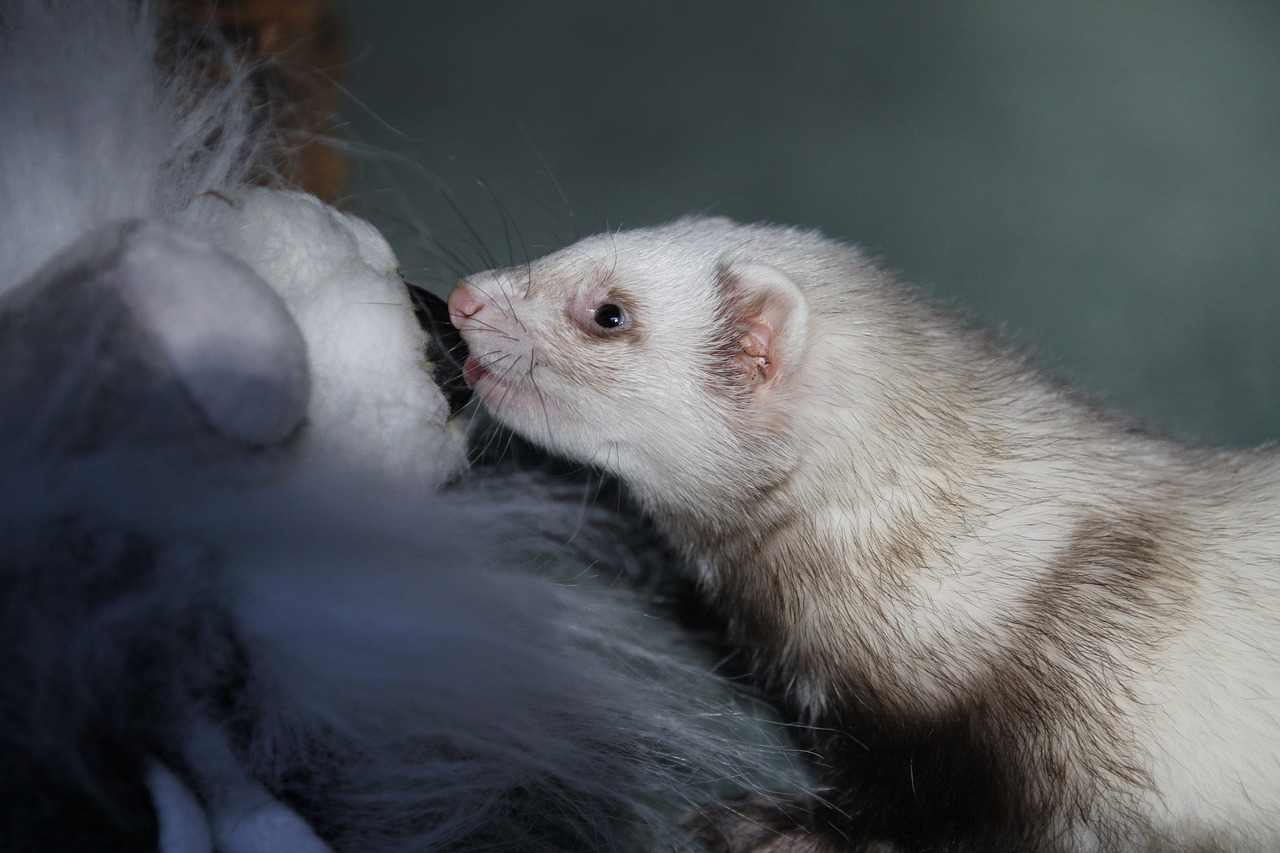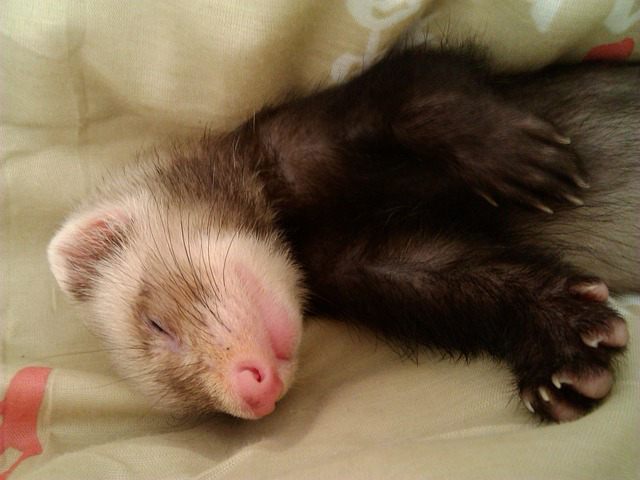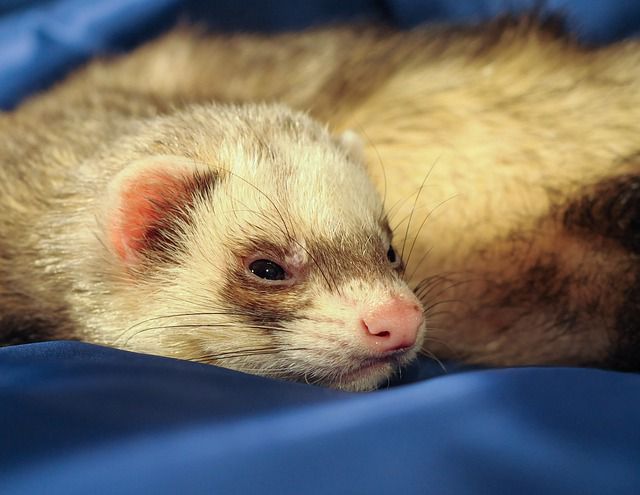11 Most Common Ferret Depression Symptoms

Today, let’s dive into a topic that might surprise you: ferret depression symptoms. Yes, just like us, these furry little friends can experience the blues too.
In this article, we’ll explore the telltale signs of ferret depression and discover ways to help them bounce back to their cheerful, playful selves.
So, let’s get started, shall we?
Ferret Depression Symptoms
Ferret depression symptoms may include lethargy, loss of appetite, decreased activity, and behavioral changes such as being less playful or interactive.
It’s important to monitor your ferret closely and consult a vet if you notice these signs, as they may indicate emotional distress or an underlying health issue.
It’s also worth considering providing environmental enrichment and spending quality time with your ferret to help alleviate their distress
Let’s break it down further…
Here are some of the most common ferret depression symptoms you should know:
1. Changes in Eating Habits
One of the signs of ferret depression can be changes in eating habits. If your typically voracious eater suddenly loses interest in food or demonstrates a significant decrease in appetite, it could be a cause for concern.
Some depressed ferrets may eat less, while others may even stop eating altogether.
It’s important to monitor your ferret’s food intake and consult a veterinarian if you notice any significant changes.
2. Lethargy and Inactivity
Depressed ferrets often exhibit lethargy and a lack of energy. They may become less playful, lose interest in their toys, and show a general lack of enthusiasm for activities that once excited them.
You might notice your ferret spending more time sleeping or lying down rather than engaging in typical energetic behavior.
Keep an eye out for any prolonged periods of inactivity or a noticeable decrease in your ferret’s overall energy level.
3. Avoidance of Interaction
Ferrets are naturally social animals, so when they’re feeling down, they may withdraw and avoid interaction with their human companions and even other ferrets.
A depressed ferret may retreat to its hiding spot, refuse to come out, or display a lack of interest in being handled or played with.
This behavior can be a sign that something isn’t right, and it’s important to provide support and seek professional advice if you observe these changes in your ferret’s behavior.
4. Changes in Sleeping Habits
Ferrets are known for their love of sleep, but changes in their sleeping patterns can indicate depression.
A depressed ferret might sleep more than usual or experience difficulty sleeping, leading to restless nights.
Keep an eye out for any significant disruptions in your ferret’s sleep routine, such as excessive sleeping or frequent awakenings during the night.
5. Over-grooming
Have you noticed that your usually well-groomed ferret has been excessively grooming themselves lately? Over-grooming can be a sign of stress or depression.
Ferrets are naturally clean animals, but when they’re feeling down, they may spend an excessive amount of time grooming their fur.
They may even groom themselves to the point of causing skin irritations or bald patches.
6. Staring into Space
Ferrets are curious and playful creatures, so if you notice your ferret spending long periods of time just staring into space without any interest in their surroundings, it could be a sign of depression.
They may seem unresponsive or detached from their usual environment. This behavior is a noticeable departure from their normally energetic and inquisitive nature.
7. Decreased Grooming
On the flip side of over-grooming, some depressed ferrets may exhibit a decrease in grooming behavior.
They may neglect their usual self-care routine, leading to a disheveled appearance.
Their fur may become matted, and they may develop a dull coat. This lack of grooming can be a reflection of their low mood and lack of interest in taking care of themselves.
8. Loss of Interest in Play
Playfulness is a defining characteristic of ferrets, so if your usually playful ferret suddenly loses interest in toys, games, or interacting with you, it could be a sign of depression.
They may become lethargic, preferring to sleep or lie around rather than engaging in their usual active and exploratory behaviors.
This lack of enthusiasm for play can indicate a decrease in overall enjoyment and well-being.
9. Unusual Posture
One of the signs of ferret depression can be observed through changes in their posture.
A depressed ferret may exhibit a slouched or hunched posture, where they appear to be less active and lack their usual energy.
They may spend prolonged periods in a curled-up position, with their head down and their body low to the ground. This change in posture can indicate a decrease in their overall mood and well-being.
10. Changes in Vocalization
Ferrets are naturally curious and vocal animals, so a noticeable change in their vocalization patterns can be an indication of depression.
Typically, a cheerful and content ferret engages in playful vocalizations such as chuckling, chattering, or even hissing when excited.
However, a depressed ferret may become unusually silent or exhibit a decrease in vocalization.
They may become quieter or emit softer, more subdued sounds, reflecting their lowered mood and lack of enthusiasm.
11. Changes in Behavior
Depression can also manifest in changes in a ferret’s behavior. Normally, ferrets are highly social and energetic creatures, so a sudden withdrawal from social interactions can be a red flag.
A depressed ferret may isolate themselves more frequently, avoiding interaction with both humans and other ferrets.
They may lose interest in playing with toys or engaging in their usual activities. In addition, a depressed ferret may experience changes in their eating and sleeping patterns.
They might lose their appetite, lead to weight loss, or exhibit disrupted sleep with excessive lethargy or insomnia.
Remember, these symptoms can also be indicative of other health issues, so it’s crucial to consult a veterinarian for an accurate diagnosis.
Ferrets are sensitive animals, and timely intervention can make a significant difference in their overall well-being.
Read more about why ferrets bite.
Dealing with Ferret Depression
Dealing with ferret depression can be tough, but there are some effective solutions to help them out.
First off, make sure they have a stimulating environment with plenty of toys, tunnels, and things to explore.
Also, spending quality time with them, playing and bonding, can really lift their spirits.
Providing a balanced diet and ensuring they get enough exercise is important too.
It’s also helpful to create a consistent routine and environment to give them a sense of security.
Lastly, if the depression persists, consulting a veterinarian who specializes in exotic pets can provide valuable insight and support.
Remember, a little love and care can go a long way in helping our furry friends feel better!
Related Questions
How can I tell if my ferret is depressed?
Ferrets can show signs of depression through changes in behavior such as reduced activity, loss of appetite, hiding, or excessive sleeping. If you notice any of these signs, it’s important to consult a veterinarian for a proper evaluation.
What are the common causes of depression in ferrets?
Common causes of depression in ferrets include changes in their environment, lack of mental stimulation, illness, or the loss of a companion. It’s essential to address any changes in their routine and provide them with plenty of enrichment to help prevent depression.
Can ferret depression be treated?
Yes, with proper care and attention, ferret depression can be treated. Providing a stimulating environment, social interaction, and regular playtime can help alleviate their symptoms. In some cases, a veterinarian may also recommend medication or other treatments.
How can I help my depressed ferret feel better?
You can help your ferret feel better by spending quality time with them, providing new toys and activities, and ensuring they have a comfortable and secure living space. Additionally, keeping their routine consistent and providing a balanced diet can contribute to their overall well-being.
Can ferret depression be mistaken for illness?
Yes, ferret depression can sometimes be mistaken for illness, as the symptoms can overlap. It’s important to monitor your ferret closely and seek veterinary advice if you notice any concerning changes in their behavior or health.
Are there any warning signs that indicate my ferret may be developing depression?
Warning signs of potential depression in ferrets may include decreased interest in their surroundings, changes in eating or drinking habits, and reduced interaction with their human companions. Monitoring these behaviors can help in early detection and intervention.
Conclusion
In conclusion, understanding ferret depression symptoms is crucial for responsible pet owners. By recognizing signs like decreased appetite, lethargy, and social withdrawal, we can provide the support and care our furry friends need. Remember, with love and attention, we can help our ferrets live happy and fulfilling lives.

![Ferret Depression [Signs, Causes & Solutions] Ferret Depression](https://petcreeks.com/wp-content/uploads/2023/12/ferret-2194028_1280-768x510.jpg)

![How to Train a Ferret Not to Bite [Helpful Tips] How to Train a Ferret Not to Bite](https://petcreeks.com/wp-content/uploads/2023/12/istockphoto-177817907-612x612-1.jpg)

![Ferret Whimpering [Causes & How To Respond] Ferret Whimpering](https://petcreeks.com/wp-content/uploads/2023/12/ferret-1970169_640.jpg)
